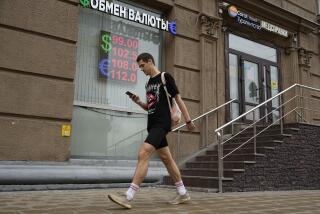Radical Reformer Resigns Over Lost Influence in New Russian Cabinet : Economics: Finance Minister Fyodorov stabilized ruble and cut inflation. Uneasy coalition of free-marketeers and bureaucrats comes to end.
- Share via
MOSCOW — Finance Minister Boris G. Fyodorov, the young Western-schooled economist who made fighting inflation the top priority of Russia’s market reforms, said Thursday that he is resigning after losing a struggle for influence in a new Cabinet.
The Cabinet, appointed earlier in the day by President Boris N. Yeltsin, is dominated by older, Soviet-trained managers who favor government subsidies to revive production and cushion the transition from communism that has made life harder for many Russians.
“The period of market romanticism has ended for us,” Prime Minister Viktor S. Chernomyrdin said in announcing the new lineup. He set less ambitious goals for reducing inflation and said he will try “non-monetary” methods of doing so, even hinting at negotiated wage and price controls.
Four hours after being stripped of his title of deputy prime minister in the new Cabinet, Fyodorov summoned reporters to announce his resignation, effective next week. He predicted that the new government will be overwhelmed by hyper-inflation within four months.
The shake-up came after five days of political tension that sent the ruble plunging, and it marked a watershed in Russia’s turbulent post-Soviet history. It ended nearly two years of uneasy rule by a coalition of bureaucrats led by Chernomyrdin, 55, and radical free-marketeers led by Fyodorov, 35, and Yegor T. Gaidar, 37. Gaidar opened the drama by resigning Sunday as economics minister.
*
The struggle between these forces, who find little middle ground, is central to Russian politics. Gaidar and Fyodorov worked to sell state enterprises, let unprofitable firms go bankrupt and hold down state spending. They argued that inflation would wreck the free market in Russia. Chernomyrdin believes the free market may ruin Russia’s industrial might.
Stung by the poor showing of Gaidar’s pro-Yeltsin party in last month’s parliamentary elections, Yeltsin sided reluctantly with the managers--just a week after assuring President Clinton during their summit meeting here that market reforms would continue.
At a news conference Thursday, Chernomyrdin repeated that pledge. He said he will continue to work with Western governments and financial institutions that have backed the reforms with more than $43 billion in aid pledges.
American officials publicly welcomed these assurances. Privately, they were dismayed by the changes, especially the ouster of Fyodorov, who had worked closely with U.S. Treasury Secretary Lloyd Bentsen.
“Our message to the new government is this: We can’t make bad policies work,” a State Department official said. “We want to sit down at an early point with them and discuss the shaping of policies that will permit us to work with them.”
Chernomyrdin, who once ran the Soviet Union’s natural gas industry, said his top priority is to revive Russia’s factories and farms, which produced 14% less last year than in 1992. He said the government will use inflationary subsidies but promised to limit them, though not as tightly as Fyodorov has done.
*
The Cabinet shake-up reflected Chernomyrdin’s growing political clout as well as the strong showing of anti-reform forces in the election. Taking the initiative, he got Yeltsin to reduce the number of deputy prime ministers from nine to four, demoting only those close to the reformers.
Ranking first among the deputies is Oleg N. Soskovets, former head of the Soviet metals industry. The others are Alexander K. Zaveryukha, a Communist collective farm boss; Yuri Yarov, a former Communist Party official in Leningrad (now St. Petersburg), and Anatoly B. Chubais, an economist and the lone reformer near the top.
Alexander N. Shokhin, a onetime ally of Gaidar who recently adopted more statist views, replaced him as economics minister. And Chernomyrdin announced that Viktor V. Gerashchenko, a bitter critic of the reformers, will remain president of the Russian Central Bank.
Ministers in non-economic posts were not affected by the shake-up.
After Gaidar’s resignation deprived him of a leading symbol of reform, Chernomyrdin tried to get Fyodorov to stay on as a reassuring figure for the West. But the economist, a tough bureaucratic infighter, demanded in return that Gerashchenko and Zaveryukha be fired or made subordinate to him. He was rebuffed.
“This is a typical Soviet government,” Fyodorov commented Thursday night. He sounded relieved to be out of the struggle and confident that without him--the man who stabilized the ruble and cut inflation by more than half--things can only get worse.
*
Western officials and other Russian economists were not so gloomy. They said that even Chernomyrdin, who has only a slight grasp of economics but wants to oversee financial policy, seems to understand the risks of hyper-inflation.
They also noted that Russia’s ambitious privatization program, which has put 40% to 50% of the economy in private hands in less than two years, won Chernomyrdin’s endorsement to move to completion in the coming months under the direction of Chubais.
Despite economic uncertainty, a new Russian-American Enterprise Fund, financed with U.S. aid, announced this week that it will soon start disbursing $340 million to help Russian companies adjust to market conditions.
But Chernomyrdin faces the immediate problem of stabilizing confidence in the ruble, which plummeted in value from 1,354 to 1,604 per dollar this week out of fear that it will be weakened by an outburst of inflation. The ruble recovered slightly, closing Thursday at 1,553 to the dollar, but only after heavy support from the Central Bank.
Times staff writer Doyle McManus in Washington and Sergei L. Loiko of the Moscow Bureau contributed to this report.
More to Read
Sign up for Essential California
The most important California stories and recommendations in your inbox every morning.
You may occasionally receive promotional content from the Los Angeles Times.













